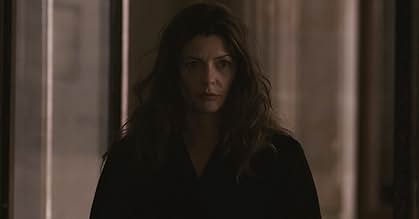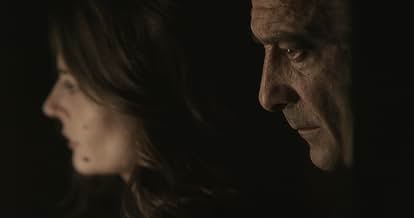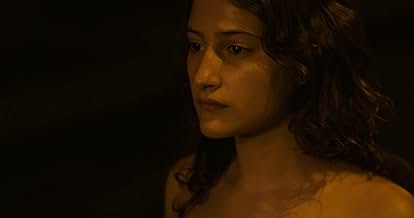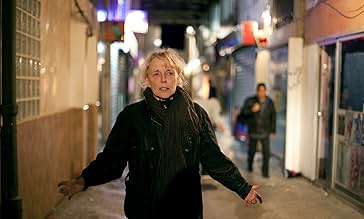CALIFICACIÓN DE IMDb
6.1/10
3.9 k
TU CALIFICACIÓN
Tras el suicidio de su cuñado, Marco regresa a París, donde tiene como objetivo al hombre que su hermana cree que causó la tragedia, aunque no está preparado para sus secretos, que rápidamen... Leer todoTras el suicidio de su cuñado, Marco regresa a París, donde tiene como objetivo al hombre que su hermana cree que causó la tragedia, aunque no está preparado para sus secretos, que rápidamente enturbian las aguas.Tras el suicidio de su cuñado, Marco regresa a París, donde tiene como objetivo al hombre que su hermana cree que causó la tragedia, aunque no está preparado para sus secretos, que rápidamente enturbian las aguas.
- Dirección
- Guionistas
- Elenco
- Premios
- 1 premio ganado y 4 nominaciones en total
- Dirección
- Guionistas
- Todo el elenco y el equipo
- Producción, taquilla y más en IMDbPro
Opiniones destacadas
Hard hitting, beautiful, feminist and intelligent, the film is not an easy watch. The story is not told in a straightforward way and things do not go the way we expect. Tough and torrid, the tale unfolds in many different ways before us and we struggle, as does the main protagonist, to deal with what turns out to be an almost labyrinthine problem - even though we are only really talking about a couple of guys, their women and some girls. So beautifully is this shot that there were occasions where I seemed to miss a plot point, so in awe of the way some 'ordinary' scene was portrayed, and I assume this was intentional, one of the various means by which we become side-tracked here until faced with the awful and final denouement.
An alienated man returns to Paris in heavy rainfall in an attempt to mend family affairs in the wake of a suicide and substantial monetary damage. He discovers that human hearts, including his own, are not as repairable as he would prefer. Director Claire Denis displays a mastery of imagery, detail, tension and emotion in a dark story that goes back and forth in time and patiently reveals secrets. The introverted characters of her story attempt to react with confidence and courage to the bleak circumstances, malevolent figures, and fears that hem them in, yet their trust and hope hang on a thread. The film is enthralling, dark and brooding.
A rambling script that jumps so often from one person to another; one scene to another; one plot structure to another that you're left wondering if this is a story or an exercise in the writers/director being enamored with their cleverness. The inconclusive and illogical, abrupt ending is further proof of the film makers' self-absorption. Excessive use of flash backs and constant, shifting brief moments with each character leaves the viewer caring less about the principal vehicle - the life of a young girl in a prostituting environment. I usually have high regards for French film studios efforts, especially with their crime/thriller movies, but in this case ... Final verdict - who cares!
I think the title describes almost all of the characters. The editing and the story are hard to follow. All that puts off the senses and no matter how hard you look, there are no heroes, on the contrary.
Oh boy. Truly brace yourself for this one.
Read nothing about it, know that vaguely it is about evil, and just plunge into it. Others will in due time cleanly explain the plot, if they haven't already. In a nutshell there's a mother who is partly responsible for letting her daughter stray in drugs and prostitution and her brother who comes to investigate what happened.
But the point is to not have a scaffold as you watch. Yes, we were all as confused as you up to some point, it's designed that way. There's no pretension in the sense of trying to make you feel stupid for not 'getting it'. You have to simply stay there as sense bleeds into anxious confusion. It's what the film is about and made so it happens across the whole film to you.
Okay, the idea is that some things are so horribly dark and beyond sense that deviously they rearrange the soul of the viewer and create a film like this to shroud themselves in. Lynch works in a comparable way. To avoid spoilers, let's just say here it's tied to sexual abuse.
What happened is so unfathomable it appears to curse the reality of the film in the following way: some things happen now, some in one character's dreams, some in another's, some are woven together to conceal what they suggest. It's a deliberate choice for example to have the sister and mistress next door look alike so when the brother has sex with her we register the hum of an unspoken evil - this is so bold, and risky, and at the expense of an easy viewing. Denis wants you to feel this hum. Risky because maybe 1 in 10 viewers will embrace the cognitive dissonance.
Some parts completely bend causality: so when the man goes to his sister's house to sell his Alfa Romeo to a husband we know is dead at some point, trying to place that in the timeline causes us to hallucinate. Some are shot to appear as if in the past: the notion that the brother and mistress perhaps knew each other and scheme together, causing us to hallucinate a possible past story.
Another is placed in the following startling way: a mysterious snippet of a few seconds shows policemen search the woods only to find the boy's yellow bicycle, it's never apparent where this fits in the flow until we've seen the whole thing through and assume it was probably the mother's anxious dream, yet in the moment and afterwards we process it with the same premonition it's being dreamed. Has it happened? Is it going to?
Just the other day I wrote about another Denis film, how trying to present an inner transformation indirectly brought her in line with every other filmmaker currently worth knowing in the search for a new visual logic for the transcendent stuff. Inland Empire is Lynch's latest answer to that. Malick works in the calligraphic eye. Reygadas recently had a an ambitious failure after a great success.
Little did I know she was incubating something as profoundly challenging as this. Here we are made to hallucinate, to create a troubling past, to get it wrong in the attempt to get it right - mirroring the brother's investigation. It haunts because what's wrong here that appears this way?
A film like Seven is the most basic setup of this effort to decipher. We are able to predict the machinations (Biblical murder) but not not why or when. So we wonder and stress. Nothing's wrong with us, it's just some evil out there, the world makes perfect sense without it. On the higher end of sophistication there's Mulholland Dr. where we begin experiencing mysterious events but something's amiss about their mechanism, something is changing the whole sense of the world.
This is similar, something from the inside is preventing sense. It won't have anywhere near Mulholland's visibility, because it's shot with a realistic bend to make everything appear on the same ground. Denis was lucky to have known Tarkovsky where the inspiration for the visual logic appears to come from, but she hasn't mastered flow the same way. She isn't seductive like Lynch. There are no mystical elements, only a drab mystery that confounds.
Some things are so intimately dark we create ignorance to prolong having to know. So we watch this in the same ignorance and confusion until it reveals itself to be about an incomprehensible evil. This is the only reason I keep from fully endorsing this.
So we'll either leave this ignorant of what it was or realize in the end that we can't really know this much ignorance. Why did he do it?
I predict it won't fare particularly well, which is a shame. Here is some of the most striking cinematic craft right now for me. I mean, if someone asked me, what's a film that is at the forefront of cinematic advance on how we make sense, I would say right here. Know this, know the internal logic. Keep it in yourself in just that way until you decide to discard it.
Read nothing about it, know that vaguely it is about evil, and just plunge into it. Others will in due time cleanly explain the plot, if they haven't already. In a nutshell there's a mother who is partly responsible for letting her daughter stray in drugs and prostitution and her brother who comes to investigate what happened.
But the point is to not have a scaffold as you watch. Yes, we were all as confused as you up to some point, it's designed that way. There's no pretension in the sense of trying to make you feel stupid for not 'getting it'. You have to simply stay there as sense bleeds into anxious confusion. It's what the film is about and made so it happens across the whole film to you.
Okay, the idea is that some things are so horribly dark and beyond sense that deviously they rearrange the soul of the viewer and create a film like this to shroud themselves in. Lynch works in a comparable way. To avoid spoilers, let's just say here it's tied to sexual abuse.
What happened is so unfathomable it appears to curse the reality of the film in the following way: some things happen now, some in one character's dreams, some in another's, some are woven together to conceal what they suggest. It's a deliberate choice for example to have the sister and mistress next door look alike so when the brother has sex with her we register the hum of an unspoken evil - this is so bold, and risky, and at the expense of an easy viewing. Denis wants you to feel this hum. Risky because maybe 1 in 10 viewers will embrace the cognitive dissonance.
Some parts completely bend causality: so when the man goes to his sister's house to sell his Alfa Romeo to a husband we know is dead at some point, trying to place that in the timeline causes us to hallucinate. Some are shot to appear as if in the past: the notion that the brother and mistress perhaps knew each other and scheme together, causing us to hallucinate a possible past story.
Another is placed in the following startling way: a mysterious snippet of a few seconds shows policemen search the woods only to find the boy's yellow bicycle, it's never apparent where this fits in the flow until we've seen the whole thing through and assume it was probably the mother's anxious dream, yet in the moment and afterwards we process it with the same premonition it's being dreamed. Has it happened? Is it going to?
Just the other day I wrote about another Denis film, how trying to present an inner transformation indirectly brought her in line with every other filmmaker currently worth knowing in the search for a new visual logic for the transcendent stuff. Inland Empire is Lynch's latest answer to that. Malick works in the calligraphic eye. Reygadas recently had a an ambitious failure after a great success.
Little did I know she was incubating something as profoundly challenging as this. Here we are made to hallucinate, to create a troubling past, to get it wrong in the attempt to get it right - mirroring the brother's investigation. It haunts because what's wrong here that appears this way?
A film like Seven is the most basic setup of this effort to decipher. We are able to predict the machinations (Biblical murder) but not not why or when. So we wonder and stress. Nothing's wrong with us, it's just some evil out there, the world makes perfect sense without it. On the higher end of sophistication there's Mulholland Dr. where we begin experiencing mysterious events but something's amiss about their mechanism, something is changing the whole sense of the world.
This is similar, something from the inside is preventing sense. It won't have anywhere near Mulholland's visibility, because it's shot with a realistic bend to make everything appear on the same ground. Denis was lucky to have known Tarkovsky where the inspiration for the visual logic appears to come from, but she hasn't mastered flow the same way. She isn't seductive like Lynch. There are no mystical elements, only a drab mystery that confounds.
Some things are so intimately dark we create ignorance to prolong having to know. So we watch this in the same ignorance and confusion until it reveals itself to be about an incomprehensible evil. This is the only reason I keep from fully endorsing this.
So we'll either leave this ignorant of what it was or realize in the end that we can't really know this much ignorance. Why did he do it?
I predict it won't fare particularly well, which is a shame. Here is some of the most striking cinematic craft right now for me. I mean, if someone asked me, what's a film that is at the forefront of cinematic advance on how we make sense, I would say right here. Know this, know the internal logic. Keep it in yourself in just that way until you decide to discard it.
¿Sabías que…?
- TriviaThe title and film itself are inspired by Akira Kurosawa's movie Los canallas duermen en paz (1960) which in French was translated to 'Les Salauds Dorment en Paix.'
- ErroresThe car being crashed/towed is not the same as previously driven, but an older Audi model.
- ConexionesFeatured in Film '72: Episode dated 11 February 2014 (2014)
- Bandas sonorasPut Your Love in Me (fade)
Performed by Les Salauds
Selecciones populares
Inicia sesión para calificar y agrega a la lista de videos para obtener recomendaciones personalizadas
- How long is Bastards?Con tecnología de Alexa
Detalles
Taquilla
- Total en EE. UU. y Canadá
- USD 24,525
- Fin de semana de estreno en EE. UU. y Canadá
- USD 4,432
- 27 oct 2013
- Total a nivel mundial
- USD 439,935
- Tiempo de ejecución1 hora 40 minutos
- Color
- Mezcla de sonido
- Relación de aspecto
- 1.85 : 1
Contribuir a esta página
Sugiere una edición o agrega el contenido que falta

Principales brechas de datos
What is the Spanish language plot outline for Los canallas (2013)?
Responda
































